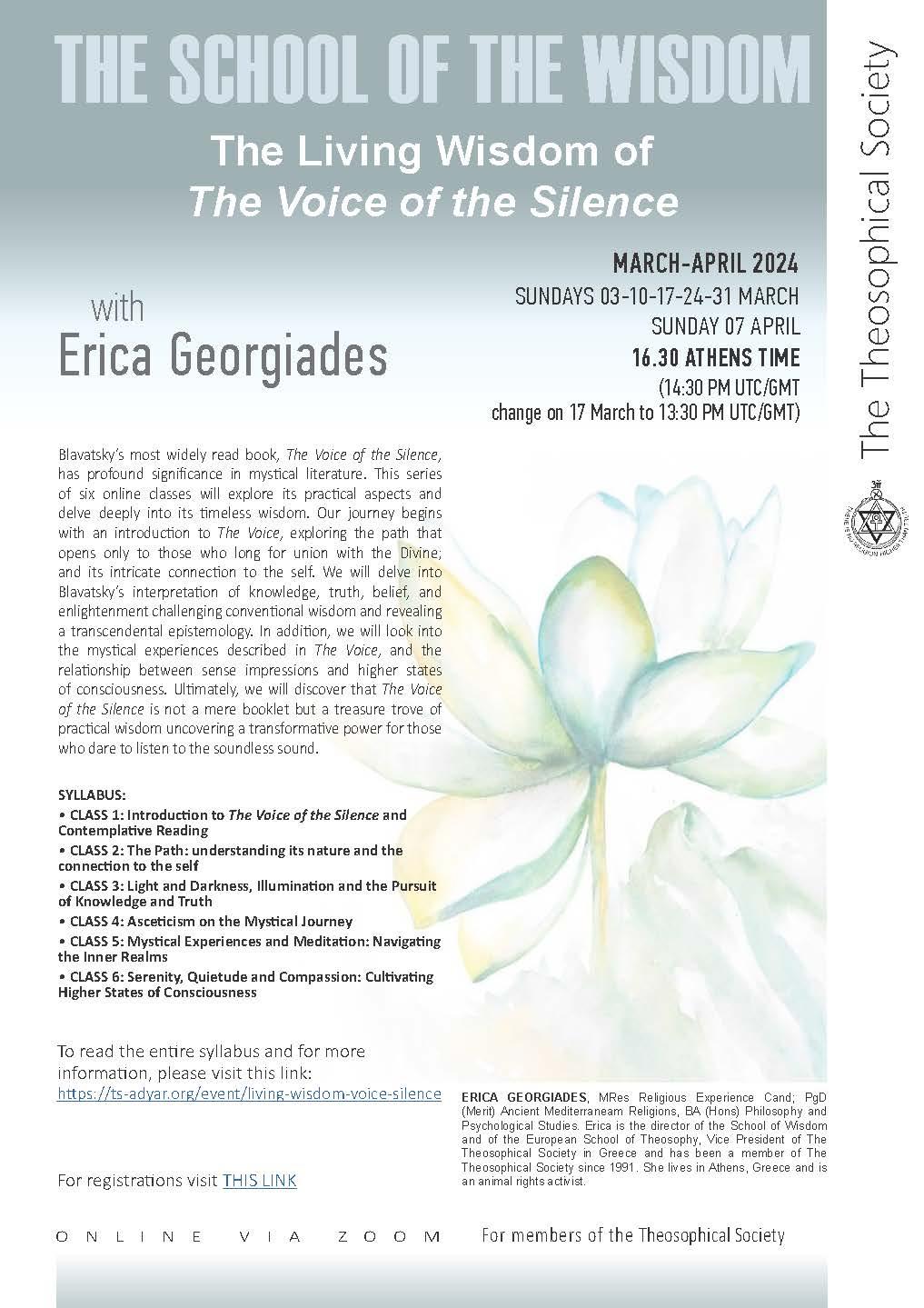Subject
Venue
Time (IST)
Event Speaker
Sign Up Link
Event pdf
Content
Sundays March 3, 17, 24,
Sunday, April 7, 14, 21
TIME
16:30 Athens Time (14:30 PM UTC/GMT, change on 17 March to 13:30 PM UTC/GMT)
check your local time
Blavatsky's most widely read book, The Voice of the Silence, has profound significance in mystical literature. This series of six online classes will explore its practical aspects and delve deeply into its timeless wisdom. Our journey begins with an introduction to The Voice, exploring the path that opens only to those who long for union with the Divine; and its intricate connection to the self. We will delve into Blavatsky's interpretation of knowledge, truth, belief, and enlightenment challenging conventional wisdom and revealing a transcendental epistemology. In addition, we will look into the mystical experiences described in The Voice, and the relationship between sense impressions and higher states of consciousness. Ultimately, we will discover that The Voice of the Silence is not a mere booklet but a treasure trove of practical wisdom uncovering a transformative power for those who dare to listen to the soundless sound.
Syllabus:
Class 1: Introduction to The Voice of the Silence and Contemplative Reading
- Understanding the significance of The Voice of the Silence in mystical literature. Keys to identify mystical literature.
- Introducing The Voice of the Silence and key themes.
- Introducing contemplative reading.
- Engaging in contemplative exercises to deepen understanding and personal insights.
Class 2: The Path: understanding its nature and the connection to the self.
- Introducing the path as portrayed in The Voice of the Silence.
- Discussing the prerequisites to embarking on the path, particularly the longing to unite with the divine.
- Exploring the nature of the self.
- Engaging in contemplative exercises to deepen understanding and personal insights.
Class 3 Light and Darkness, Illumination and the Pursuit of Knowledge and Truth.
- Exploring the Role of Light and Darkness in The Voice of the Silence.
- Delving into the relationship between knowledge, truth, belief and illumination in the Voice of the Silence.
- Exploring the role of belief and Blavatsky's transcendental epistemology.
- Engaging in contemplative exercises to deepen understanding and personal insights.
Class 4: Asceticism on the Mystical Journey
- Exploring asceticism as portrayed in the Voice of the Silence.
- Discussing the relationship between asceticism and ethics in The Voice of the Silence.
- Looking into the relationship of asceticism and ethics in The Voice of the Silence.
- Engaging in contemplative exercises to deepen understanding and personal insights.
Class 5: Mystical Experiences and Meditation: Navigating the Inner Realms
- Exploring the different types of mystical experiences described in The Voice of the Silence;
- The role of Meditation and contemplation
- Delving into Blavatsky's interpretations of sensory impressions and higher states of consciousness.
Class 6: Serenity, Quietude and Compassion: Cultivating Higher States of Consciousness
- Discussing the importance of serenity, quietude and compassion in The Voice of the Silence.;
- Exploring what entails a harmonious environment to facilitate self-realisation.
- Practical aspects of The Voice of the Silence to cultivate tranquillity, peace and compassion.
- Engaging in contemplative exercises to deepen understanding and personal insights.
Note: Each class will involve interactive discussions, readings from The Voice of the Silence, contemplative exercises, and opportunities for personal reflection and sharing.
Disclaimer: Participants are encouraged to explore further and form their own conclusions based on individual study and introspection. This syllabus is a general outline and may be subject to minor adjustments or modifications based on students' needs and overall progress throughout the classes.
Requirements
- Access to "The Voice of the Silence" by Helena Petrovna Blavatsky Recommended edition: Blavatsky, H. P. (1889). The Voice of The Silence. California: Theosophical University Press.
- Reliable internet connection for online classes
- Active participation in class discussions and activities
- Completion of assigned readings and any supplementary materials
- Short reflective assignments after each class
- Final project: A written reflection or creative project showcasing the understanding and insights gained during the classes.
Recommended bibliography
Blavatsky, H. P. (1888). "What is Truth?" Lucifer, v. 1, n. 6. http://www.katinkahesselink.net/blavatsky/articles/v9/y1888_009.htm
Blavatsky, H. P. (1889). The Voice of The Silence. California: Theosophical University Press. Available free here https://www.theosociety.org/pasadena/voice/VoiceoftheSilence_eBook.pdf
Burnier, Radha (1082). Stages on the Path. https://theosophicalsociety.org.au/articles/stages-on-the-path
Georgiades, Erica (2020). The Voice of the Silence A Manual for Mystics. Video https://www.youtube.com/watch?v=G6QvlR9WDnY
Zirkoff, B. "How the Voice of the Silence was Written.” The Voice of the Silence. http://prajnaquest.fr/blog/wp-content/uploads/here.pdf
Suggested Reading
Sangharakshita, Bhikshu (1958). Paradox and Poetry in ‘The Voice of the Silence.’ http://www.easterntradition.org/article/Paradox%20and%20Poetry%20in%20The%20Voice%20of%20the%20Silence.pdf
Mills, J. The Voice of the Silence
https://archive.org/details/voice-silence-vol-2-mills
Reigle, D & N. (1999). “Bringing the Heart Doctrine to the West.” Blavatsky’s Secret Books.
The Structure of the Spiritual Path - Fragments II & III of The Voice of the Silence Ingmar de Boer https://www.youtube.com/watch?v=W894UMBX3kk

